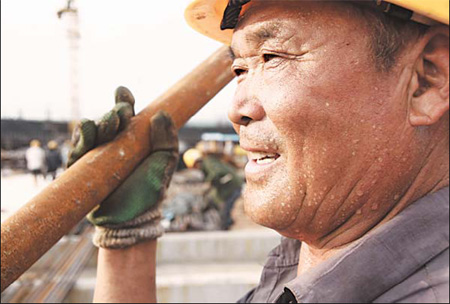Under a merciless sun, life goes on
With temperatures soaring up to 40 C in a number of Chinese cities, people across the country have been furiously looking for ways to stay cool. For many workers, though, there is little option but to sizzle under the sun.
 |
|
A worker carries building material on a construction site on Tuesday in Nanyang, Henan province, where the temperature reached 40 C. |
Construction crews, street cleaners, delivery boys and kitchen staff are just some of those struggling in the face of trying conditions.
Yet, China Daily has discovered that few of these workers are even aware of a law that requires employers to pay staff extra in a heat wave.
Armed with a large bottle of water to stave off dehydration, Qu Guorong arrived to start his shift at a Beijing building site on Tuesday afternoon, when the temperature was 40 C.
"What can I do? The work needs to be finished on time," said the 54-year-old migrant worker, who helps build a luxury residential block in northeast Beijing where apartments are selling for 53,000 yuan (US$7,800) per square meter.
When not at work, Qu sleeps in a room he shares with 15 other workers in a three-story portable block 500 meters away. A handful of 40-yuan electric fans on the ground floor are the only things offering respite from the extreme heat.
Inside, 29-year-old Zhang Haiguang was laid on his bunk bed looking visibly ill.
"I don't feel well so I've taken the day off," said the plumber from Hubei province. The decision means his wages will be docked 90 yuan, the amount he receives for each shift.
Beijing's meteorological center issued the year's first "orange alert" on Monday when the temperature hit 40.3 C - the highest temperature recorded in July since 1951.
Although health and safety regulations require companies to give staff extra cash for working in very hot conditions, almost none of the workers interviewed for this story said they had received it.
A joint notice issued by the Ministry of Health, the Ministry of Human Resources and Social Securities and the All-China Federation of Trade Unions in 2007 stated allowances must be paid to workers who toil outdoors in temperatures above 35 C or in enclosed environments, such as offices and warehouses, in temperatures above 33 C.
How much employers pay is set by provincial governments due to the wide variations in China's regional weather patterns.
Beijing this month doubled the allowance set in 2007 to a minimum of 120 yuan for outdoor workers and 90 yuan for indoor workers, according to a statement from the capital's bureau of human resources and social security.
However, experts say firms are avoiding making the extra payments thanks to loopholes in the system and a general lack of enforcement.
Sun Qunyi, a researcher with the Ministry of Human Resources and Social Securities, said the regulation is mandatory but falls down because there is no punishment mechanism and enforcement is poor.
"Current regulations on labor usually stipulate only what employers should do, they don't set penalties," said Ye Hailin, a researcher from Chinese Academy of Social Sciences. "Local governments should find a way to ensure enterprises follow the regulations."
The country's only legal document on health and safety in the heat was published in 1960 and covers only traditional industries, such as agriculture, transport and mining. Modern industries, like the service sectors, are not included.
To escape working during the hottest part of the day, construction workers have adjusted their schedule to work early in the morning - some start at 4 am - and late at night. Officials with Beijing government said companies are not allowed to cut workers' pay due to the change, and possible reduction, in the working hours.
Staff on a building site in Qingdao, Shandong province, were also given free green bean soup, a traditional remedy for heat fatigue, and essential balms. The city government also ordered construction to stop if the temperature exceeds 37 C.
In the afternoon, many migrant workers head to air-conditioned subway stations.
Xu Dongyun, a 40-year-old carpenter from Hebei province, sat on the floor of Shaoyaoju station in Beijing reading a kung fu novel, while 20 meters away women played with their children on blankets. Others simply stood and watched the commercials on small television screens dotted around the station.
"I know it's hot outside but (loitering) is against the regulations," said Beijing Subway worker Wang Xifeng as she shooed several people out of the station. "They block the way for genuine passengers and it looks bad."
After quickly getting tired of seeing people disappear through exit A only to return through exit B, Wang gave up.
"It's OK as long as they don't smoke," she said with a tired sigh.
 0
0 






